The Politics of Minority Rights in Pakistan
Pakistan, a nation celebrated for its cultural diversity and rich history, is home to numerous ethnic and religious minorities. However, the politics surrounding minority rights in Pakistan remain complex and often contentious. This article delves into the intricate dynamics of minority rights within the country’s political landscape, examining both the challenges and progress made over the years.
Understanding Minority Rights in Pakistan
Minority rights refer to the special rights and protections granted to groups that differ from the majority population. In Pakistan, these groups include, but are not limited to:
- Hindus
- Christians
- Sikhs
- Ahmadis
- Various indigenous tribes
Historical Context
The political treatment of minorities in Pakistan dates back to its creation in 1947. At its inception, the country was framed as a safe haven for Muslims of the Indian subcontinent, often marginalizing non-Muslim communities in the process. The political narrative shifted over the decades, influenced by various socio-political and religious movements.
Key Challenges Faced by Minority Groups
1. Legal and Constitutional Barriers
While Pakistan’s constitution recognizes the rights of minorities, laws like the blasphemy laws often place them at a significant disadvantage. These laws can be misused, leading to discrimination and violence.
2. Societal Discrimination
Minorities frequently face societal prejudice, leading to exclusion from social, economic, and political spheres. This discrimination is perpetuated by stereotyping and a lack of awareness about minority cultures.
3. Political Representation
Although some political parties advocate for minority rights, representation is still limited. Many minorities feel that their voices are drowned out in the political arena, which hinders their ability to influence policies directly affecting their communities.
Case Studies: Minority Rights in Action
Case Study 1: The Hindu Community
The Hindu community in Pakistan, primarily residing in Sindh, has historically faced issues regarding land rights and forced conversions. Numerous advocacy groups have emerged to fight for their rights, pushing for better legal protections and social acceptance.
Case Study 2: The Christian Minority
Christians in Pakistan have faced challenges, notably around educational and employment opportunities. Organizations like *The Human Rights Commission of Pakistan* have been instrumental in advocating for their rights, undertaking campaigns to dissuade religious intolerance and promote inclusion.
Benefits of Upholding Minority Rights
Ensuring the rights of minorities is not just a moral obligation; it also brings several benefits to society:
- Promotes Social Cohesion: Fostering inclusion leads to a more harmonious society.
- Enhances Economic Development: An inclusive environment encourages diverse talents and ideas, which can stimulate economic growth.
- Strengthens Democratic Institutions: Upholding minority rights reinforces the principles of democracy and equality.
Practical Tips for Advocacy
Individuals and organizations wishing to support minority rights in Pakistan can consider the following:
- Engage in awareness campaigns to educate the public about minority cultures.
- Support political candidates who advocate for minority rights.
- Collaborate with local NGOs focused on minority empowerment.
First-Hand Experiences
Many activists share transformative stories highlighting the struggles and resilience of minority communities in Pakistan. Groups like *The Indus Valley School of Art and Architecture* often engage their students in projects that illustrate these narratives, bridging gaps between communities.
Conclusion
The politics of minority rights in Pakistan underscores a critical aspect of the nation’s journey towards inclusivity and equality. As society continues to evolve, recognizing and upholding the rights of minorities will not only foster peace but also contribute to a more democratic and prosperous Pakistan. It is essential for all citizens to partake in this advocacy to ensure a brighter future for every Pakistani, regardless of their background.



